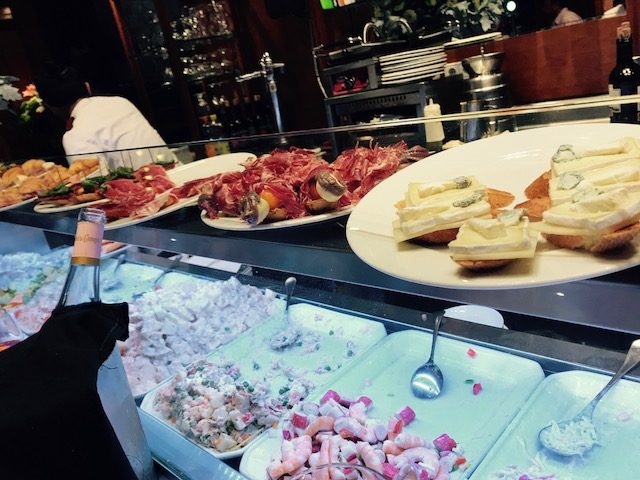
Before I departed on my Churchill travels many previous fellows told me to expect the unexpected and to not be surprised if opportunities to extend my original program sprang up. Churchill fellows, being generally inquisitive and enthusiastic types, also advised me to take as much advantage of everything that presented itself as possible!
I was lucky enough to be able to have a pre-Churchill holiday in one of my favourite places in the world (Italy) which was also my (planned) first stop on the Fellowship. Toward the end of my holiday I stumbled across the webpage for the annual conference of the European Association of Centres of Medical Ethics and noticed it was happening in a few days’ time in nearby Barcelona. I contacted the organisers who kindly arranged a last-minute registration, and with a quick re-jig of holiday plans, a short internal flight (such a novelty to us Australians!), and a very understanding husband, I landed in Barcelona.
The conference was hosted by the Institut Borja de Bioètica, Universitat Ramon Llull. The IBB was the first bioethics centre in Spain, established in 1976 by an obstetrician/gynaecologist with undergraduate training in philosophy and theology. The theme of the 2017 conference was “Justice in Healthcare: Values in Conflict” and the conference program was excellent. Keynote presentations were relevant, thoughtful and clearly communicated to a very multidisciplinary audience. I particularly enjoyed the talk by Dr Yvonne Denier, a philosopher from the University of Leuven. In Health Care Systems: At the Service of What? She took us on a thought-provoking trip through theories of justice and how they might be useful for healthcare. She characterised the value conflicts within healthcare systems as an incompatible triad, using the example of Butler who tells of a sign in a mechanic’s garage advising its customers about the services it provides:
We provide three kinds of services – cheap, quick and reliable. You can have any two…If it’s cheap and quick, it won’t be reliable. If it’s cheap and reliable, it won’t be quick. And if it’s quick and reliable, it won’t be cheap.
In healthcare, Dr Denier asserts that the values in conflict are, economic efficiency, justice, and decent quality care. She then went on to suggest ways that we can reconcile this incompatible triad and proved herself, in my opinion, to be one of those philosophers who can really speak to the practical application of philosophy. I think we can gain an immense amount by harnessing thinking like this in our day to day work in clinical medicine.
In the concurrent sessions, I was constantly conflicted about which room to be in as there were so many interesting presentations. I was also completely unable to do my usual thing of identifying a session that I could skip in order to explore the local sights! I have long been an advocate for the Capabilities Approach (CA) when dealing with issues of justice, particularly in the paediatric context. Dr Eva De Clercq spoke of using the CA when thinking about involving children in consent, and argued we should shift our paradigm to thinking of children who are active beings who are already part of society rather than as impaired adults needing preparation for adulthood. This, she argued, will build a model of capacity that is one of a common responsibility between child, parents and health care workers, where all seek to expand the child’s capability set. Based on my own experience working in paediatrics, Dr De Clercq’s ideas are a breath of fresh air and I can see real ways forward in their practical application. There were several presentations on different aspects of Moral Case Deliberation by brilliant researchers from the Netherlands. In my opinion, this group is doing some of the most thoughtful work on evaluating clinical ethics support in the world. Of particular novelty in this evaluative space, is the development of the Euro-MCD instrument. Another highlight of the conference for me was listening to Dr Alessandra Gasparetto, winner of the EACME Paul Schotsmans Prize for Talented PhD Scholars, present Ethics Experts: still wondering whether they do exist. How are they expected to help in clinical ethical decision-making? Dr Gasparetto gave a thoughtful and incisive analysis of the major models of clinical ethics support, highlighting the urgency of more clearly defining the role of clinical ethics and clinical ethicists. Watch this space – I believe there are some forthcoming publications which I will be sure to link to.
In addition to the interesting conference program, the social functions were a lot of fun. This was my third visit to Barcelona and I felt, as I have every other time, that I’d have loved to stay longer. The buzz of the streets, the exquisite food and wine, the beauty of the architecture and the warmth of the people struck me anew. The conference was closed in truly Spanish style – after the closing address the team from IBB put on a famous song and started Flamenco dancing, quickly turning the conference into a joyful conga line! The Europeans aren’t just thoughtful ethicists, they really know how to party 🙂 I can unreservedly recommend the EACME conference to anyone in the world interested in medical ethics.
Recent Comments